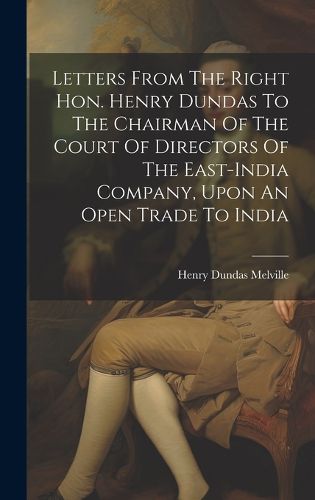Readings Newsletter
Become a Readings Member to make your shopping experience even easier.
Sign in or sign up for free!
You’re not far away from qualifying for FREE standard shipping within Australia
You’ve qualified for FREE standard shipping within Australia
The cart is loading…






This collection of letters, published in 1794, reflects a key debate in British imperial and economic history. Henry Dundas, a prominent statesman and member of the Board of Control for India, argues that the Eastern trade should be opened up to free competition. His opponents, including the East India Company, allege that such a policy would be ruinous both for British merchants and Indian producers. This volume provides a rare window into the world of colonial commerce and politics in the late 18th century.
This work has been selected by scholars as being culturally important, and is part of the knowledge base of civilization as we know it.
This work is in the "public domain in the United States of America, and possibly other nations. Within the United States, you may freely copy and distribute this work, as no entity (individual or corporate) has a copyright on the body of the work.
Scholars believe, and we concur, that this work is important enough to be preserved, reproduced, and made generally available to the public. We appreciate your support of the preservation process, and thank you for being an important part of keeping this knowledge alive and relevant.
$9.00 standard shipping within Australia
FREE standard shipping within Australia for orders over $100.00
Express & International shipping calculated at checkout
This collection of letters, published in 1794, reflects a key debate in British imperial and economic history. Henry Dundas, a prominent statesman and member of the Board of Control for India, argues that the Eastern trade should be opened up to free competition. His opponents, including the East India Company, allege that such a policy would be ruinous both for British merchants and Indian producers. This volume provides a rare window into the world of colonial commerce and politics in the late 18th century.
This work has been selected by scholars as being culturally important, and is part of the knowledge base of civilization as we know it.
This work is in the "public domain in the United States of America, and possibly other nations. Within the United States, you may freely copy and distribute this work, as no entity (individual or corporate) has a copyright on the body of the work.
Scholars believe, and we concur, that this work is important enough to be preserved, reproduced, and made generally available to the public. We appreciate your support of the preservation process, and thank you for being an important part of keeping this knowledge alive and relevant.